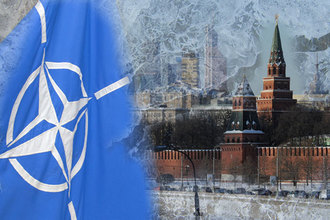Uladzimir Matskevich: We shouldn’t exclude chances of NATO-Russia collision at the Ukrainian land

However, Russia isn’t ready for a full-scale confrontation with the Western world as ever.
Russia-Ukraine war and West’s reaction to it became the main point of another G7 Summit that gathered at the Bavarian ski resort of Garmisch-Partenkirchen on June 7-8.
The first day of work resulted in a common statement made by Barack Obama and Angela Merkel about the need to leave sanctions against Russia until Minsk agreements about the ceasefire are fulfilled.
«The leaders of the two countries discussed the on-going crisis in Ukraine and agreed that the duration of sanctions should be clearly linked to Russia’s complete implementation of the Minsk agreements and respect for Ukraine’s sovereignty”, - says the statement of the White House, published after the meeting of Barack Obama and Angela Merkel at the G7 Summit.
What will be the reaction of the “Great Seven” to the activation of hostilities at Donbas? Is there a chance that Russia will be included in the number of world leaders? Is armed collision between NATO and Russia only possible in sick imagination?
Uladzimir Matskevich, the head of the Board of the International Consortium “EuroBelarus “, shared his point of view with the “EuroBelarus” Information Service.
- On June 7 another G7 Summit gathered at the Bavarian ski resort of Garmisch-Partenkirchen. One of the central issues of the Summit’s agenda is the situation in Ukraine. Will the diplomatic pressure on Kremlin aimed at making Russia cease the support of “DPR” and “LPR” bring the expected effect?
- The question about the Russia-Ukraine war and sanctions against Russia doesn’t come off the agenda for more than a year now. So we shouldn’t expect more from the summit in this sense. However, the knot is tightening, so the discussion of the problem might bring something new.
However, we should remember that no decisions are made at the meetings of the “Great Seven”; strategic line, stance of separate countries, and common stance are elaborated there. Only afterwards, based on the common stance, certain decisions can be made. In this case the question about expanding sanctions against Russia is burning. Further concrete actions of the G7 leaders depend on the developments in Ukraine.
- A Canadian Prime Minister Steven Harper believes that Russia excluded from the G7 for Crimea’s annexation shouldn’t get back until Putin stays in power. However, most European politicians think differently and stand for Russia’s returning back to the world leaders. What scenario is most possible?
- I think that the scenario voiced by the Canadian Prime Minister is more possible than an attempt to return Russia back to G7 in its current state and with its current leadership. By its economic indicators and influence in the world Russia was invited to the club of the leading world states in advance with expectation of its economic and political development and strengthening of authority. However, with his latest actions Putin has basically stultified all diplomatic accomplishments that he made earlier. That is why it is quite hard to expect such advancing now.
Clearly, invitation of Russia lead by Putin to the club of great states can only happen if the West is ready to shut its eyes to the Russia’s aggression and support of gunmen in Donbas. But according to the statements of the G7 leaders it is hardly possible.
- But still, pro-Russian lobby has put quite firm roots into the West. What can the restoration of Russia in G7 lead to?
- Let’s assume that seven is not that big number.
There is no pro-Russian lobby in Japan at all; it doesn’t work in the USA, and there is certain lobby in Great Britain, but it hardly influences the decisions of the English government.
Germany, France, and Italy might be partially pro-Russian – three out of seven countries. This isn’t a majority, obviously. Moreover, pro-Russian lobby in Germany has activated considerably, which causes, natural concern of both the government and all political elites of Germany. That is why it is unlikely to yield to lobbying.
As to Canada, pro-Ukrainian lobby is also quite strong there.
I think that this political spectrum doesn’t play for Russia’s benefit.
- Vladimir Putin in the interview with the Italian newspaper Corriere della Sera excluded the possibility of a military conflict between Moscow and NATO: “The world has changed so drastically that people with some common sense cannot even imagine such a large-scale military conflict today”. Putin states one thing, but very often acts differently. How crazy does the military conflict of Russia with NATO look, especially in the light of the war in Ukraine?
- Putin declares banalities. Indeed, the world has changed to such a degree, that one can only imagine military confrontation between NATO and Russia in their sick imagination. Even if the conflict develops to confrontation, they won’t happen directly, but at the territory of the third countries, Ukraine in particular.
But Putin forgot to tell the main thing: low possibility of military collision between Russia and NATO is also explained with the fact that Russia is weak and not prepared to such confrontation. That is why hostilities of Russia in Georgia, Transdniestria, and at the Russian territory – in Chechnya, and now in Ukraine – are manifestation of Russian weakness, manifestation of imperial aspirations, striving for demonstrating or simulating the erstwhile power. Russia isn’t ready for a full-scale confrontation with the Western world as ever.
-
03.01
-
07.10
-
22.09
-
17.08
-
12.08
-
30.09








































